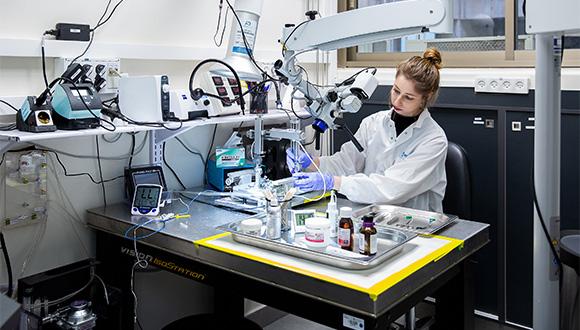Research at the Sagol School of Neuroscience
How do we make up our minds?
"Do you have a hard time deciding what to study, what to wear, what to have for dinner? Researchers at the Sagol School of Neuroscience are trying to understand what happens in our brain when we try to make up our minds: What are the mechanisms that enable us to weigh two alternatives and decide which is better? To what extent is this process conscious, or is the feeling that we are actually making a decision no more than an illusion, with the entire process taking place unconsciously? Our brain is able to make complex decisions, sometimes in a split second, and our researchers try to understand exactly how this happens," says Prof. Liad Mudrik of the School of Psychological Sciences and the Sagol School of Neuroscience.
Here are five interesting things you should know about the brain, disclosed by Prof. Segev Barak of the School of Psychological Sciences and the Sagol School of Neuroscience:
- With every thought, idea or memory that occurs to us, our brain changes. Researchers at the Sagol School have shown that learning, remembering and thinking change our brain cells, starting at the microscopic level of molecules, proteins and genes in the brain, all the way to the structure of neurons.
- Are fears and thought patterns inherited? You'll be surprised to learn that they are! Research at Sagol School reveals that certain behavior patterns and emotions we have developed in our lifetime may be passed on to our descendants through processes called epigenetics (which of course you can study with us).
- What do psychiatric medications and psychotherapy have in common? Both generate long-term changes in the structure and functions of the brain. That's why sometimes a combination of medication and psychotherapy is better for treating disorders like depression, anxiety and addiction, than each type of treatment separately – the whole is greater than the sum of its parts when we speak of our brain.
- Can memories by erased? We have always been taught that it's important to remember, but it turns out that forgetting is just as important. Some memories can seriously disrupt our functioning (as happens in anxiety attacks or addictions), and at Sagol School you will learn how to prevent such memories from forming, and even how they can be erased.
- We have not yet found a cure for the neurodegenerative diseases of the brain, such as Alzheimer's and Parkinson's, which are among the greatest challenges of the modern age. But if you choose to study at the Sagol School of Neuroscience, you may be the one who finally deciphers these diseases and finds the cure – from the molecular level to the level of computation modeling.
Since Sagol School offers such a wide selection of cross-faculty study programs – there is no discipline in which research is not conducted (and we are waiting for your original ideas, that will surprise us and lead us onwards in pursuit of the unknown).
If you wish to learn how researchers at the Faculty of Life Sciences discovered what the brains of dolphins, humans and kangaroos have in common, discover how a brain-on-a-chip was developed at the Faculty of Engineering, or read about the connection between autism and Alzheimer's and the treatment for both developed at the Faculty of Medicine – you will find it all here, at the place that generates collaborations among researchers from many different disciplines.
Come and meet more than 100 researchers from 7 different faculties, who have already published hundreds of groundbreaking papers in diverse areas – from psychology and education, through first-of-its-kind medical research, to new discoveries on society and behavior. They're all here, at the Sagol School of Neuroscience.


